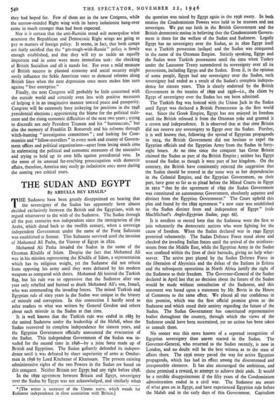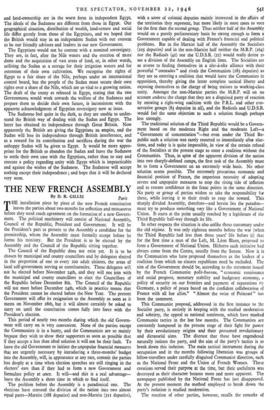THE SUDAN AND EGYPT
By ABDULLA BEY KHALIL*
THE Sudanese have been greatly disappointed on hearing that the sovereignty of the Sudan has apparently been almost decided exclusively between the British and the Egyptians, with no regard whatsoever to the wish of the Sudanese. The Sudan through all the past centuries was independent since the immigration of the Arabs, which dated back to the twelfth century, when a sovereign independent Government under the name of the Fung Sultanate was established at Sennar. This Sultanate survived until the invasion of Mohamed Ali Pasha, the Viceroy of Egypt in 1820.
Mohamed Ali Pasha invaded the Sudan in the name of the Ottoman Khalifa of Islam. Despite the fact that Mohamed All was in his mission representing the Khalifa of Islam, a representation which has its religious weight, yet the Sudanese did not refrain from opposing his army until they were defeated by his modern weapons as compared with theirs. Mohamed Ali hoisted the Turkish flag, but his rule was so oppressive that the Sudanese after one year only rebelled and burned to death Mohamed Ali's son, Ismail, who was commanding the invading forces. The mixed Turkish and Egyptian rule of sixty years in the Sudan was unique in the history of misrule and corruption. In this connection I hardly need to refer readers to what was written by General Gordon and others about such misrule in the Sudan at that time.
It is well known that the Turkish rule was ended in 1885 by the united Sudanese under the leadership of the Mahdi, when the Sudan recovered its complete independence for sixteen years, and the Egyptian Government officially announced the evacuation of the Sudan. This independent Government of the Sudan was in- vaded for the second time in 1898—by a joint force made up of British and Egyptians. The Sudan gallantly defended its indepen- dence until it was defeated by sheer superiority of arms at Omdur- man in 1898 by Lord Kitchener of Khartoum. The present existing administrative rights of the two Powers in the Sudan are based on this conquest. Neither Britain nor Egypt had any right before 1898, In the 1899 agreement between Britain and Egypt, sovereignty over the Sudan by Egypt was not acknowledged, and similarly when
*[The writer is secretary of the Ununa party, which stands for Sudanese independence in close association with Britain.] the question was raised by Egypt again in the 1936 treaty. In both treaties the Condominium Powers were held to be trustees and not sovereigns. We put our faith in the British Government and the British democratic nation in believing that the Condominium Govern- ment is there for the welfare of the Sudan and Sudanese. Legally Egypt has no sovereignty over the Sudan, as in 1820 Egypt itself was a Turkish possession (wilaya) and the Sudan was conquered in the name of the Ottoman Empire. Strictly speaking, Egypt and the Sudan were Turkish possessions until the time when Turkey under the Lausanne Treaty surrendered its sovereignty over all its possessions, including Egypt and the Sudan. Even if, in the opinion of some people, Egypt had any sovereignty over the Sudan, such sovereignty had ended as a result of the Sudan's complete indepen- dence for sixteen years. This is clearly endorsed by the British Government in the treaties of 1899 and 1936—i.e., the claim by Egypt of sovereignty over the Sudan has not been admitted.
The Turkish flag was hoisted with the Union Jack in the Sudan until Egypt was declared a British Protectorate in the first world war. Since the Greek Empire, Egypt has not enjoyed its freedom until the British released it from the Ottoman yoke and granted it a crown and independence. It is observed that at that time Britain did not reserve any sovereignty to Egypt over the Sudan. Further, it is well known that, following the spread of Egyptian propaganda in 1924, the British Government did not hesitate to expel the Egyptian officials and the Egyptian Army from the Sudan in forty- eight hours. At no time since the conquest has Great Britain claimed the Sudan as part of the British Empire ; neither has Egypt treated the Sudan as though it were part of her kingdom. On the contrary, the British have consistently rejected the suggestion that the Sudan should be treated in the same way as her dependencies in the Colonial Empire, and the Egyptian Government, on their part, have gone so far as to plead before the Mixed Courts in Egypt in 1910 "that by the agreement of 1899 the Sudan Government was constituted an autonomous Government, absolutely separate and distinct from the Egyptian Government." The Court upheld this plea and found by the 1899 agreement "a new state was established in the Sudan distinct from and independent of Egypt" (vide MacMichael's Anglo-Egyptian Sudan, page 66).
It is needless to record here that the Sudanese were the first to join voluntarily the democratic nations who were fighting for the cause of freedom. When the Sudan declared war in 1940 Egypt protested vehemently. The Sudan Defence Force stood alone and checked the invading Italian forces until the arrival of the reinforce- ments from the Middle East, while the Egyptian Army in the Sudan was confined within the lines of their barracks, giving no help what- soever. The active part played by the Sudan Defence Force in the liberation of Abyssinia and the defeat of the Italians in Eritrea and the subsequent operations in North Africa justify the right of the Sudanese to their freedom. The Governor-General of the Sudan declared in April last that no decision about the future of the Sudan would be made without consultation of the Sudanese, and this statement was based upon a statement by Mr. Bevin in the House of Commons to the same effect. We placed all our confidence in this promise, which was the first official promise given to the Sudanese and which eased their anxiety regarding the future of the Sudan. The Sudan Government has constituted representative bodies throughout the country, through which the views of the Sudanese could have been ascertained, yet no action has been taken to consult them.
No sooner was this news known of a reported recognition of Egyptian sovereignty than unrest started in the Sudan. The Governor-General, who returned to the Sudan recently, is now in London, and no doubt will be the best witness as to the state of affairs there. The 1936 treaty paved the way for active Egyptian propaganda, which has had its effect among the discontented and irresponsible elements. It has also encouraged the ambitious, and those promised a reward, to attempt to achieve their ends. It would be a terrible disappointment if the fifty years of the Condominium administration ended in a civil war. The Sudanese are aware of what goes on in Egypt, and have experienced Egyptian rule before the Mahdi and in the early days of this Government. Capitalism
and land-ownership are in the worst form in independent Egypt. The ideals of the Sudanese are different from those in Egypt. Our geographical situation, distribution of wealth, land-tenure and social life differ greatly from those of the Egyptians, and we hoped that the British would stay in an independent Sudan with our consent to be our friendly advisers and leaders in our new Government.
The Egyptians would not be content with a nominal sovereignty. They are, in fact, after the Nile waters and the erection of more dams and the acquisition of vast areas of land, or, in other words, utilising the Sudan as a storage for their irrigation waters and for extension of their own cultivation. We recognise the rights of Egypt to a fair share of the Nile, perhaps under an international control board, but the people of the Sudan must secure their own rights over a share of the Nile, which are so vital to a growing nation. The draft of the treaty as released in Egypt, stating that the two Governments would work towards the welfare of the Sudanese and prepare them to decide their own future, is inconsistent with the apparent acknowledgment of Egyptian sovereignty now at issue.
The Sudanese feel quite in the dark, as they are unable to under- stand the British way of dealing with the Sudan and Egypt. The latter has obtained its independence through Great Britain. Now apparently the British are giving the Egyptians an empire, and the Sudan will lose its independence through British interference, and as a reward for its contribution and sacrifices during the war the unhappy Sudan will be given to Egypt. It would be more appro- priate for the British to abandon the Sudan and leave the Sudanese to settle their own case with the Egyptians, rather than to stay and execute a policy regarding unity with Egypt which is impracticable and against the wishes of the Sudanese. The Sudanese will accept nothing except their independence ; and hope that it will be declared very soon.



























 Previous page
Previous page